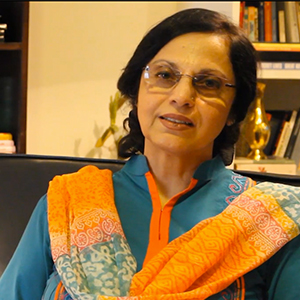STEEP TEA: Yasmeen Hameed
Every Singapore poet has an airplane poem, my friend and writer, Ruihe Zhang once said to me. It's an observation that stuck in the mind. Yes, Singaporeans love to travel out of their tiny island-state, and the quickest way to go abroad and back is to take the airplane. I wanted to write an airplane poem too, but for a long time did not know what it would be about.
Then I discovered the poems of Urdu poet Yasmeen Hameed in MODERN POETRY OF PAKISTAN, an anthology edited by Iftikhar Arif and Waqas Khwaja. Yasmeen's voice, quiet as the night, was utterly compelling. I felt strongly that the voice, like Cavafy's, was not lost through translation into English. The poems in the anthology are concerned with the appearance and disappearance of things, often evoked through the tropes of sleeping and waking. The powerful poem "Who Will Write the Epitaph?" imagines the loss of all "the earth-born." The tone is not melodramatically apocalyptic but poignantly elegiac.
The self-questioning in the poems is also immensely attractive. "I Am Still Awake" begins with lines that speak in the tone of near-disbelief:
I am still awake
like my eyes
and speak
in my own voice
my own dialect
Then the speaker explains why the self-alienation: "I have only now become acquainted with the meaning of migration." And it hit me that my airplane poem is about the difference between travel and migration. As Yasmeen puts it so eloquently, "When, sometimes, snow knocks a hole in the wall of night / I fill the hole with my body." Migration opens up a hole in one's life that migrants try to fill with all kinds of things, including a poem such as my "Airplane Poems." The attempt is futile, of course, but the gap is productive.
Yasmeen Hamid has published five books of poems in Urdu, and received several prizes for her work, including the Allama Iqbal Award, the Fatima Jinnah Medal and the Tamgha-i-Imtiaz (Medal of Excellence). She is also a translator and anthologist. Her PAKISTANI URDU VERSE was published in 2010 and DAYBREAK: WRITINGS ON FAIZ in 2013, both by OUP. She teaches Urdu Literature at the Lahore University of Management Sciences.
Then I discovered the poems of Urdu poet Yasmeen Hameed in MODERN POETRY OF PAKISTAN, an anthology edited by Iftikhar Arif and Waqas Khwaja. Yasmeen's voice, quiet as the night, was utterly compelling. I felt strongly that the voice, like Cavafy's, was not lost through translation into English. The poems in the anthology are concerned with the appearance and disappearance of things, often evoked through the tropes of sleeping and waking. The powerful poem "Who Will Write the Epitaph?" imagines the loss of all "the earth-born." The tone is not melodramatically apocalyptic but poignantly elegiac.
The self-questioning in the poems is also immensely attractive. "I Am Still Awake" begins with lines that speak in the tone of near-disbelief:
I am still awake
like my eyes
and speak
in my own voice
my own dialect
Then the speaker explains why the self-alienation: "I have only now become acquainted with the meaning of migration." And it hit me that my airplane poem is about the difference between travel and migration. As Yasmeen puts it so eloquently, "When, sometimes, snow knocks a hole in the wall of night / I fill the hole with my body." Migration opens up a hole in one's life that migrants try to fill with all kinds of things, including a poem such as my "Airplane Poems." The attempt is futile, of course, but the gap is productive.
Yasmeen Hamid has published five books of poems in Urdu, and received several prizes for her work, including the Allama Iqbal Award, the Fatima Jinnah Medal and the Tamgha-i-Imtiaz (Medal of Excellence). She is also a translator and anthologist. Her PAKISTANI URDU VERSE was published in 2010 and DAYBREAK: WRITINGS ON FAIZ in 2013, both by OUP. She teaches Urdu Literature at the Lahore University of Management Sciences.


Comments